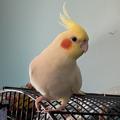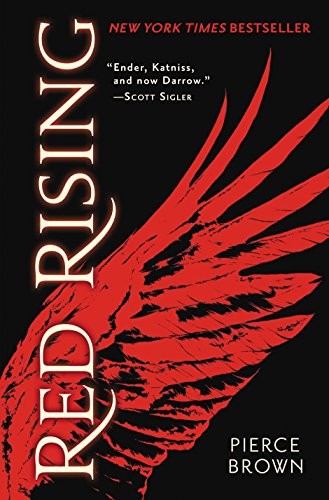coral reviewed Red Rising by Pierce Brown (Red Rising Saga, #1)
None
4 stars
I really enjoyed this, with a couple of caveats.
It's the first book I've read since [b:Anathem|2845024|Anathem|Neal Stephenson|https://d.gr-assets.com/books/1442903535s/2845024.jpg|6163095] that ended up in such a wildly different place (and genre) than where it started; for that alone, I would enjoy it, but it is also a pretty fun ride, with great thematic elements. It starts out feeling a bit like Riddick combined with various popular dystopian elements; then it picks up a little cyberpunk, a fair bit of Classicism, a little Ender's Game, a lot of Hunger Games, and there's maybe even a whiff of Harry Potter in there. (Also, Brown writes better love stories than Stephenson.)
Yes, it follows a male character, and yes, most of the movers and shakers in this world are also male; I was able to forgive that, because the writer obviously didn't forget women exist. He populates the world with fairly realistic women, who clearly have goals and stories of their own, even if they are not generally at center stage. There are role models and relatable characters there for female readers, at least, even if they're all secondary.
THIS PARAGRAPH CONTAINS A VAGUE SPOILER (and also a trigger warning and critiques):
On the problematic side: 1) it uses the woman-in-a-refrigerator trope, and, worse, 2) it uses rape as a plot point, to prove how evil someone is. In the former case, at least the woman has agency: she martyrs herself deliberately, in a fairly dramatic and meaningful way, to spur the protagonist into action. (At least it's an interesting twist on the "woman dies to move man's plot forward" idea.) In the latter case, it's almost entirely off camera, but I think it's gratuitous and unnecessary; there are other ways to establish how evil a character is. It takes away from what might otherwise be a five-star book.
Having now finished the series, I can say it continues to have a very "manly man does manly things" kind of feel to it, though it quickly ceases to feel so much like a masculine reaction to Hunger Games and grows into being entirely its own thing. Its own very Roman thing. The world stays interesting. The scope continues to increase. The characters grow (except for the one who started out perfect, who stays perfect, which is actually a little bit frustrating). Not every character is straight, which I liked; though it seems as if every character is cisgender and is (or at least starts out) able-bodied. Skin color is built into the world in weird ways, so it's either not at all or entirely about race, depending how you see it.
I have one other complaint about it, which was also a complaint about Hunger Games (and a SPOILER, so feel free to stop here): I am tired of YA(esque) books making "have a child" into the biggest possible life goal for a human being. "Congratulations, you just freed a whole society (or whatever), but until you also have a child, your life is garbage." I could live without that trope forever, thanks.

